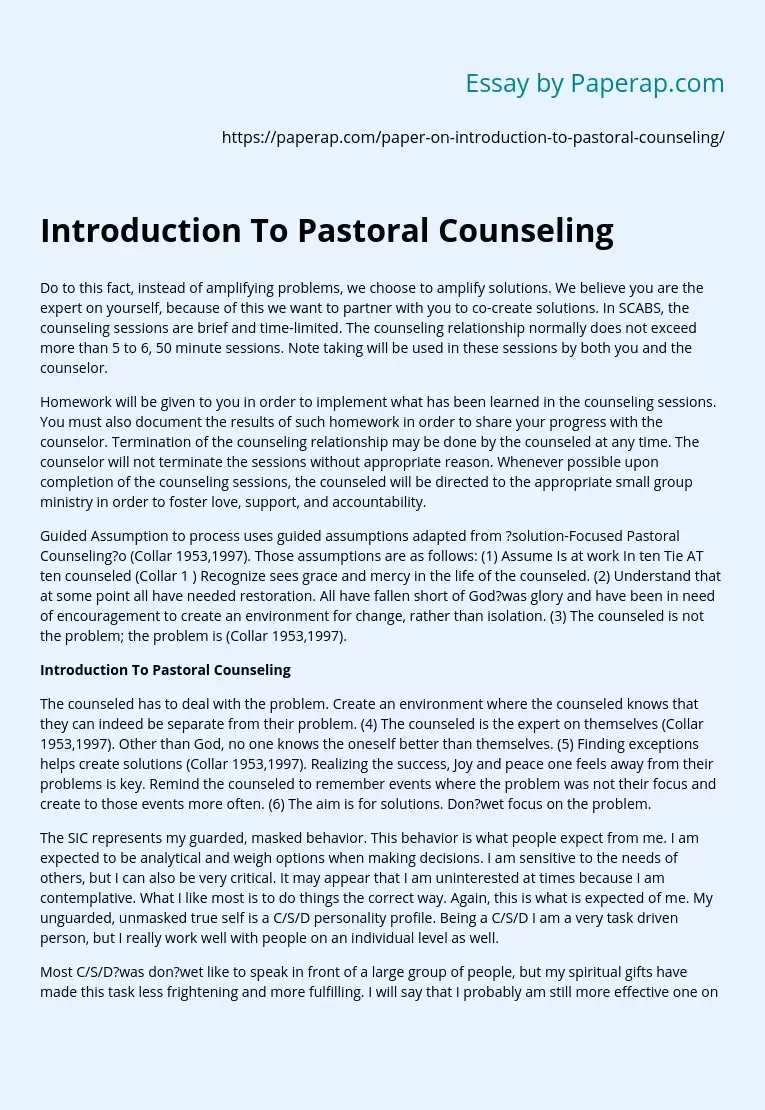Introduction To Pastoral Counseling
Do to this fact, instead of amplifying problems, we choose to amplify solutions. We believe you are the expert on yourself, because of this we want to partner with you to co-create solutions. In SCABS, the counseling sessions are brief and time-limited. The counseling relationship normally does not exceed more than 5 to 6, 50 minute sessions. Note taking will be used in these sessions by both you and the counselor.
Homework will be given to you in order to implement what has been learned in the counseling sessions.
You must also document the results of such homework in order to share your progress with the counselor. Termination of the counseling relationship may be done by the counseled at any time. The counselor will not terminate the sessions without appropriate reason. Whenever possible upon completion of the counseling sessions, the counseled will be directed to the appropriate small group ministry in order to foster love, support, and accountability.
Guided Assumption to process uses guided assumptions adapted from ?solution-Focused Pastoral Counseling?o (Collar 1953,1997).
Those assumptions are as follows: (1) Assume Is at work In ten Tie AT ten counseled (Collar 1 ) Recognize sees grace and mercy in the life of the counseled. (2) Understand that at some point all have needed restoration. All have fallen short of God?was glory and have been in need of encouragement to create an environment for change, rather than isolation. (3) The counseled is not the problem; the problem is (Collar 1953,1997).
Introduction To Pastoral Counseling
The counseled has to deal with the problem.
Create an environment where the counseled knows that they can indeed be separate from their problem. (4) The counseled is the expert on themselves (Collar 1953,1997). Other than God, no one knows the oneself better than themselves. (5) Finding exceptions helps create solutions (Collar 1953,1997). Realizing the success, Joy and peace one feels away from their problems is key. Remind the counseled to remember events where the problem was not their focus and create to those events more often. (6) The aim is for solutions. Don?wet focus on the problem.
The SIC represents my guarded, masked behavior. This behavior is what people expect from me. I am expected to be analytical and weigh options when making decisions. I am sensitive to the needs of others, but I can also be very critical. It may appear that I am uninterested at times because I am contemplative. What I like most is to do things the correct way. Again, this is what is expected of me. My unguarded, unmasked true self is a C/S/D personality profile. Being a C/S/D I am a very task driven person, but I really work well with people on an individual level as well.
Most C/S/D?was don?wet like to speak in front of a large group of people, but my spiritual gifts have made this task less frightening and more fulfilling. I will say that I probably am still more effective one on one or in a small group setting. I am really up front and frank with people, often it can be confused or taken as though I am insensitive. I am actually very sensitive and I really care about people; I Just believe that I allow things to roll off of me easily. Essential that frees me up emotionally and mentally to be able to listen to and deal with the problems of others.
I am a very serious person. I probably should lighten up a little, be more optimistic, be more positive, and less critical. I have a fairly constant personality with my guarded and unguarded self. I believe my spiritual gifts when used; help keep my personality in check. My three highest spiritual gift tendencies are: Encouraging/Exhorting; Teaching; Administration/ Ruling. This means I also tend to be more of an encouraging person. I often find myself in informal counseling situations. I have genuine concern for the well-being of others.
With that concern, comes the desire to share truth with people, mainly the truth of the gospel of Jesus Christ. I also am a visionary person who desires to organize and lead a cause. The overuse of these gifts sometimes makes me boring and annoying. I may tend to talk too much, desire to know too much. I also can be over critical Ana expect too much out AT people. 10 communicate Ana relate Walt others more effectively I should not be so hard on people, and be more sensitive to hey?were needs. I must also exhibit patience and kindness.
Introduction To Pastoral Counseling. (2019, Dec 05). Retrieved from https://paperap.com/paper-on-introduction-to-pastoral-counseling/

